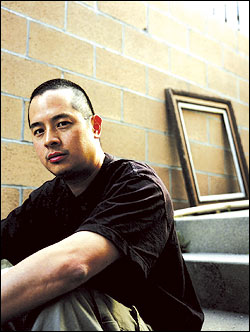BECAUSE ON RECORD the Mountain Goats often consist entirely of John Darnielle alone with his acoustic guitar, there is a tendency to imagine his work as diaristic. I know him a little bitwe’re both frequent posters on a couple of the same Internet discussion boardsand even I fall into this trap. For instance, when I interview him on the eve of his current tour, he is preparing to move from Ames, Iowa, to Chapel Hill, N.C., and I ask if the move might fuel more songs. He swiftly disabuses my notions. “No, no, no. Heavens no,” he says. “I don’t write about my own stuff, I just write stories.”
Great stories. The critical language that’s easiest to fall back on when describing the Mountain Goats’ musicmiddlebrow, NPR-ready phrases like “John Darnielle writes brilliantly observed lyrics”is also that which does it the least justice. The problem is that John Darnielle really does write brilliantly observed lyrics; he also sings them with a thin, affecting voice that makes him sound like he’s singing his life, even if he is adamant that he isn’t. The intimate charm of early Mountain Goats records also stemmed in part from the very reason not many people heard themnamely, the tape hiss. Like many of the indie-rock bands he’s identified with, Darnielle is an inveterate home recorder, and when it’s literally hard to hear what is at bottom a very direct approach (he may have the best diction in pop music), it’s easy to tune out.
But more and more people are tuning in. This is partly down to Darnielle’s work ethic, which you could call Calvinist or compulsive. In addition to his day job (he works with troubled children) and his abiding interests (he delivered what was by all accounts a stunning presentation on death metal at last year’s EMP Pop Music Studies Conference), he writes songs and criticism (for Magnet and Riverfront Times, among others), maintains a Web zine (www.lastplanetojakarta.com), andoh yeahhe makes records. Lots of records. In 2002 alone, there were five Mountain Goats CDs: three rarities compilations (Protein Source of the Future . . . Now!, Ghana, and Bitter Melon Farm), sporting hugely entertaining new liner notes (of Protein Source‘s “Going to Tennessee” and “Pure Heat,” Darnielle writes, “Both songs are about cheating death, an effort which, you’ll note, has yet to meet with success anywhere, ever”), and two discs of new material. Additionally, Saturday’s Tractor appearance follows recording sessions for the next Mountain Goats album at Bear Creek Studio in Woodinville, with John Vanderslice producing. (Darnielle says the disc will probably appear in January.)
He also tours incessantly. Live, the Mountain GoatsDarnielle abetted by multi-instrumentalist Peter Hugheshave few peers for locked-in audience-performer give-and-take. But the songs invite the intimacy. Second-person narratives like “The Best Ever Death Metal Band in Denton” and “Fall of the Star High School Running Back” (“Junior year/Blew your knee out at an out of town game . . . Selling acid was a bad idea/ Selling it to a cop was a worse one”), both from last year’s All Hail West Texas (Emperor Jones), are ace vignettes that keep you coming back.
The first-person, relationship- oriented songs on 2002’s Tallahassee (4AD), his most recent album, are so deeply felt it’s tempting to take them as lived fact rather than imagined fiction. (It’s also the most cleanly recorded record he’s made, and as a result, even more intimate than the home-taped stuff.) “Game Shows Touch Our Lives” contrasts the myth of marriage with the reality: “Our house sinking into disrepair/Ah, but look at this showroom/Filled with fabulous prizes.” “No Children” is a portrait of dissolving couplehood that’s twice as brutal as Bob Dylan’s “Idiot Wind” in about a third as much space: “I hope I lie/And tell everyone you were a good wife/And I hope you die/I hope we both die.” But there are glints of redemption, as on “Southwood Plantation Road”: “I am not gonna lose you/We are gonna stay married/In this house like a Louisiana graveyard/Where nothing stays buried.” And the heartbreaking “International Small Arms Traffic Blues” twines those two extremes, like lying in bed holding the one you love after the worst fight of your lives: “Our love is like the border between Greece and Albania/Trucks loaded down with weapons/Crossing over every night/Moon yellow and bright.”
“There’s this magazine called The World Press Review that I used to subscribe to,” says Darnielle of the unusual metaphor. “It’s a great magazine that collects editorials and news stories from around the globe that generally don’t get privileged in U.S. newspapers. I had been reading about how a lot of gun running takes place between Greece and Albaniaand if you’re reading with a narrative eye, you go, ‘Wow, the worst place you could possibly be.’ I had [verses about] a powder keg and a Cuban plane at that point, and since I was working on a trope, it just landed in there.”
But unlike a lot of words-first songsmithslatter-day Elvis Costello and Lou Reed come to mindDarnielle’s language never feels forced or stilted. “I’m lyrics-first,” he says. “I want to make sure, even though I don’t print my lyrics [in the CD booklets], that they work on paperthat if you did print them out, they would read well and you wouldn’t have to say to somebody, ‘Oh you have to hear the way he says this.’ What I do is half working formal tropes and half working the energy. [Magnetic Fields songwriter] Stephin Merritt is great, but I think his ideal situation is with somebody else doing the songs. And in mine it’s when I’m doing them.”
The Mountain Goats play Tractor Tavern with Baptist Generals, 8 p.m. Sat., Oct. 4. $8 adv.








